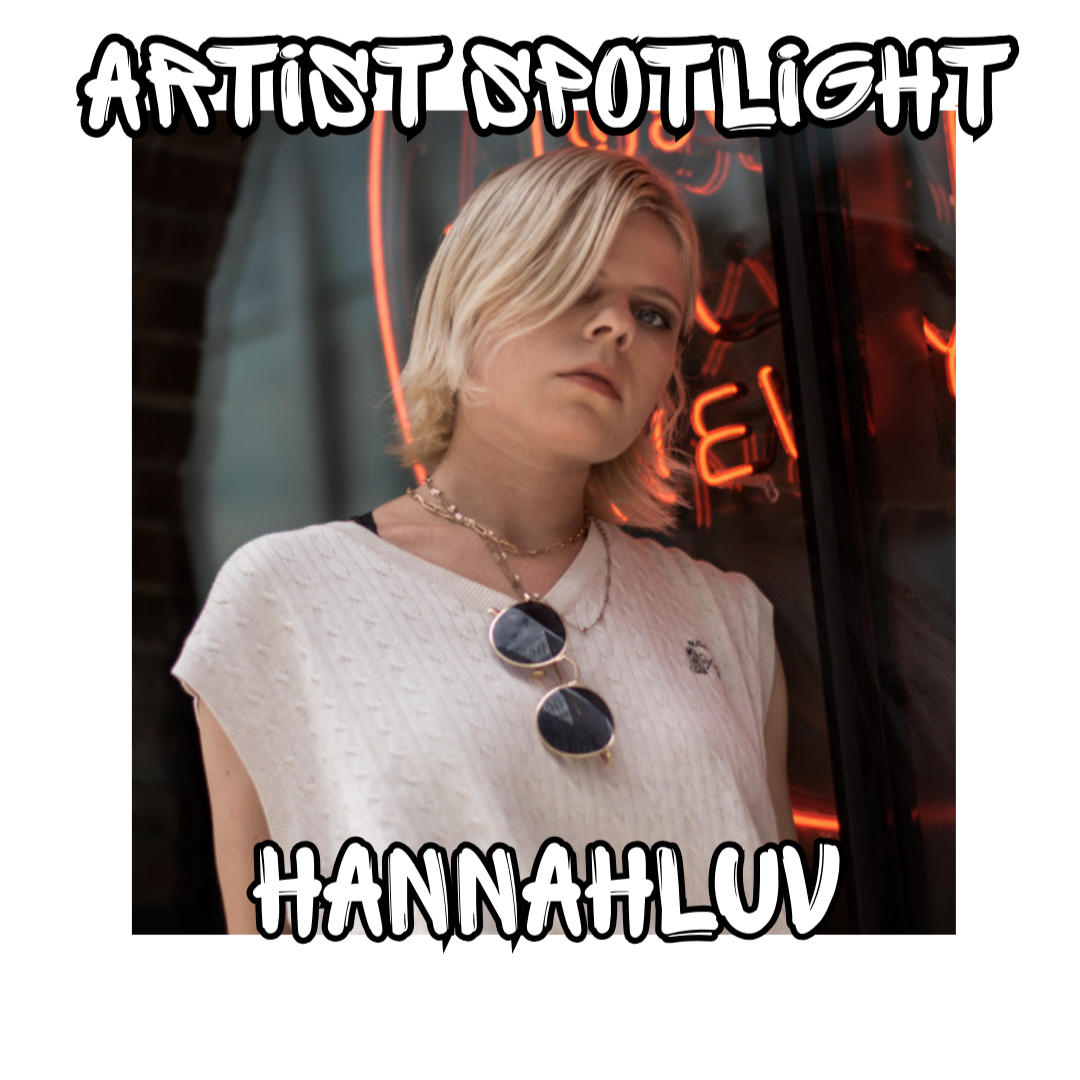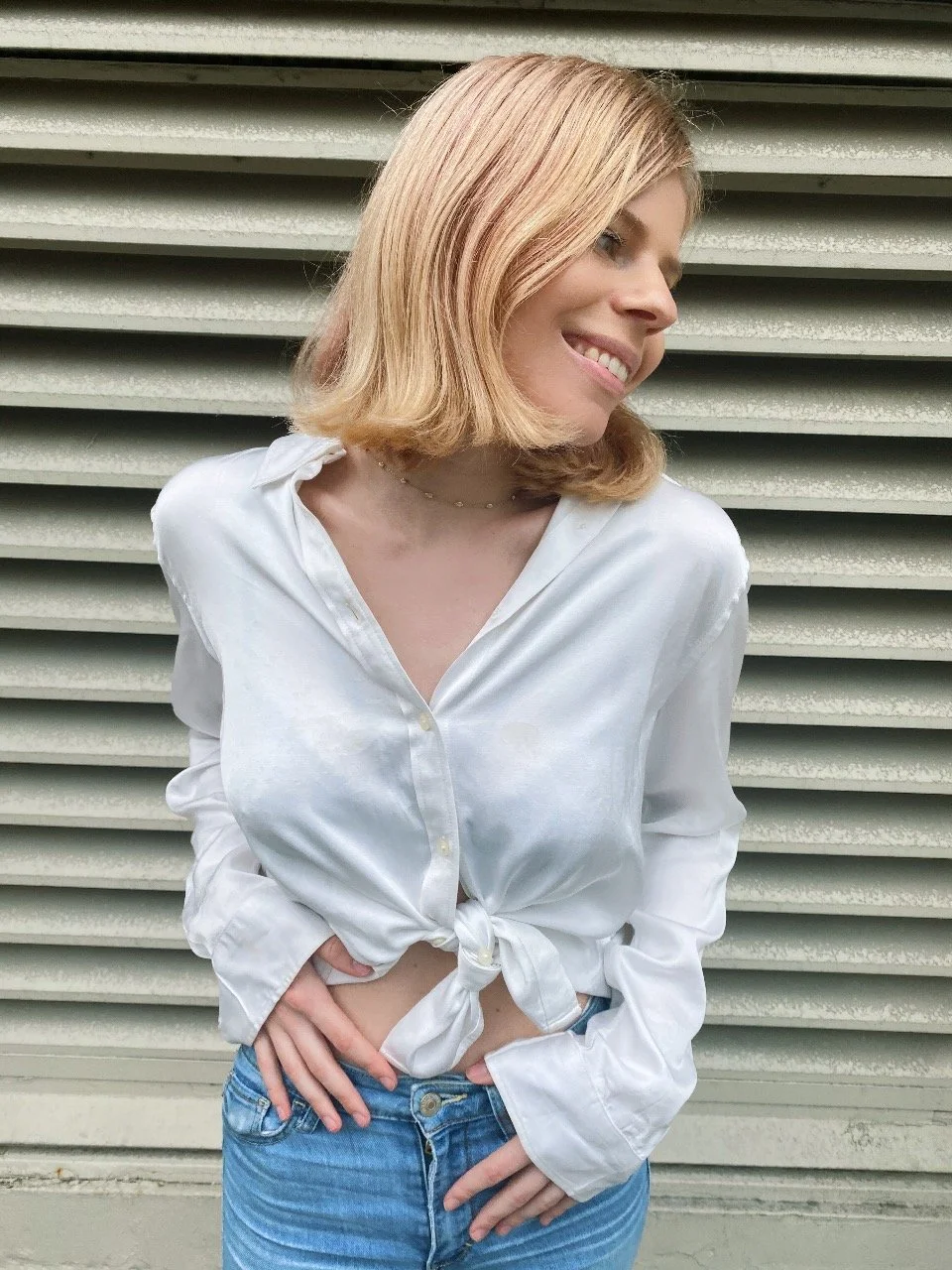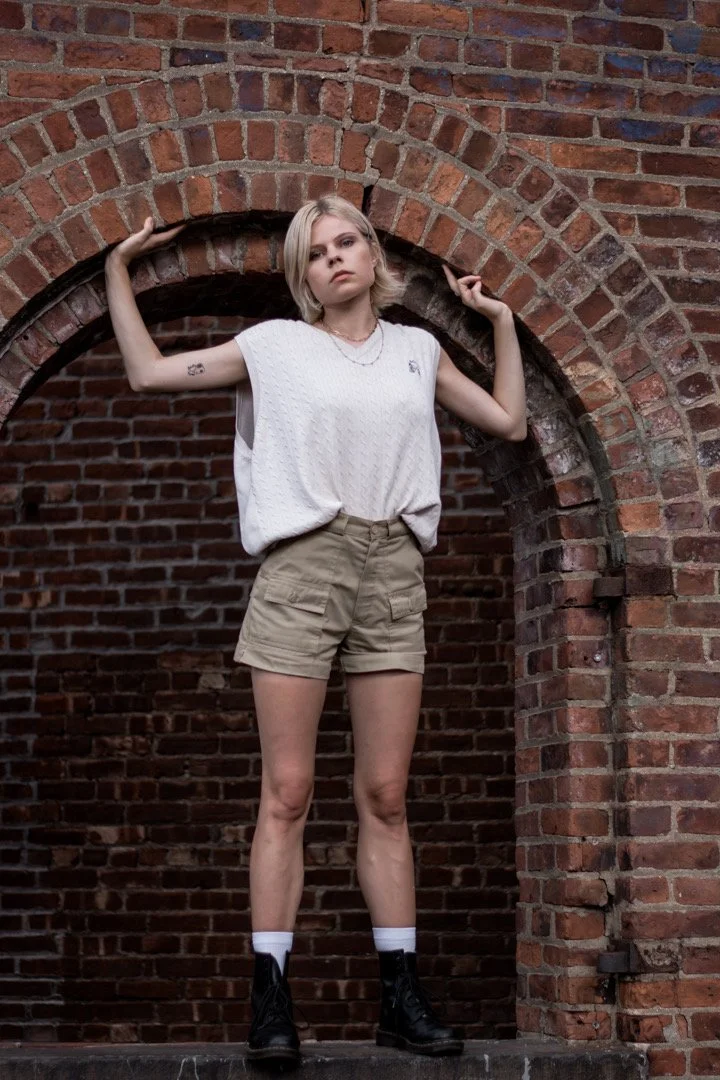HannahLuv Is Learning to Shine on Her Own Terms
On a quiet night in Harlem, Hannah Olesen pressed record in her tiny bedroom closet. Wedged between stacks of shoes, she could barely move, but she sang anyway. Her voice carried into the mic, fragile, intimate, and a little unsteady, the kind of performance no studio could manufacture. Later, while tracking another song, the creak of her bed snuck into the audio. Most artists would cut it. Hannah kept it.
Those accidents became artifacts. They’re part of what defines her stage persona, HannahLuv, a queer indie folk songwriter whose music feels like it was made in secret, whispered across the room for just you to hear. “The solitude allows me to be more free in my creative process,” she says. “I tried recording in a studio once and I felt like I had to put on a performance for a producer… it didn’t feel as organic to me.”
That unpolished honesty is Hannah’s signature. It’s why she’s found an audience, mostly through TikTok.
Musical Roots & London Days
Hannah grew up moody and musical, finding pieces of herself in artists as wide-ranging as Eminem, Avril Lavigne, and Taylor Swift. “I think I see the raw emotion of a lot of the music I listened to reflected in my music today,” she says. But it wasn’t until she moved across the ocean, settling in London for school, that she began to truly shape her voice.
“I think moving to London helped me broaden my folk music, making it more poetic and less literal,” she explains. “I also feel, before moving, my music had a little less soul to it but the culture, especially the music in London, is rich and there’s a lot you can pull from.”
She wandered into pubs, open mics, and nights of communal singing. She heard songs in accents she’d never grown up around. And slowly, London wove itself into her catalog. “I enjoyed the pub music the most and tried to incorporate that into an unreleased song called Meters,” she says. “If I had to choose a recent song that represented my inspirations from London I’d probably pick either happy, because there’s an audio clip in there from a London train or I Fell In Love With The Sun.”
That latter track is a quintessential HannahLuv song: dreamy, bittersweet, an image that doubles as a confession. “Although that song isn’t meant to be taken literally, I really did fall in love with the sun in England,” she explains. “I also created that song after a trip to Ireland and hearing someone perform Lady May by Tyler Childers. The two songs don’t show much resemblance but it made me want to create calming music that’s both sweet and bitterly sad.”
It’s a lesson she’s carried with her: sometimes the song you end up with is nothing like the one that inspired it, but the trace is still there.
Finding Her Voice
The first song that felt entirely her own was Bumble Bee Buddy, from her first EP. “It started out as a poem and ended up a song that I’m still proud of today even if it’s not my best song,” she says. “It’s all of the emotions I felt while losing so many things that I thought defined me and having to say goodbye to my past basically.”
Like a lot of Hannah’s work, it was written during a time of uncertainty. And like a lot of her work, it doubled as an anchor. She still sometimes plays it onstage, usually when nerves creep in.
Her more recent track Einstein has become something of a self-portrait, too. “It encompasses feeling like you’re not enough while simultaneously knowing that, that’s ok,” she explains. “I know I’m not where I wish I was in life but that’s just fine and I’m gonna continue being myself despite falling behind.”
Queerness & Identity
Hannah’s music is inseparable from her queerness, even if she’s still figuring out how loudly to claim it. “I don’t know if I’d describe myself as proudly queer,” she admits. “I’d love to get there someday, but I’m still a little nervous about how my entity is perceived by others. On TikTok, I can be who I am in front of strangers but in real life it’s a little harder.”
That tension shaped her first EP; “me wrestling with a lot of different feelings and some of those were feelings of being queer but not knowing how to express it,” she says. As she’s grown more confident in herself, her music has followed.
She resists easy labels, both personal and musical, but her stance is firm when it comes to what her songs mean for others. “I just tell the truth but I want everyone who listens to my music to know that there’s nothing wrong with who they are and there’s always a place for them,” she says. “Whether they’re bi, gay, queer, a man, a woman, non-binary, trans or just them. If that makes my music political then I will be the loudest, proudest political artist out there.”
Her song Fairytale Love is one of the clearest articulations of that message — a ballad about her first crush on a girl. “The love I felt I never saw in the movies I watched and so I didn’t fully realize it was something I needed in my life,” she recalls. “Now I know no matter who they are I won’t need society’s approval or ‘a ring’ to be with them. Seeing as gay marriage is now on the chopping block to be overturned I think that’s something that needs to be said.”
Writing in Silence
If her queerness gives her music its center, her solitude shapes its sound. Hannah is most alive when she’s writing and producing alone, or working virtually with producer Mykyta Honchar, who has helped bring songs like I Fell In Love With The Sun, Alone For The Apocalypse, and her next release Three Chances to life.
“There’s a part in Feels Like Home where there’s some empty space before the chorus and instead of it being awkward, audio of my bed creaking got in there and I kept it in because it went perfectly with the lyrics and the rhythm,” she says. “That’s what I love… when mistakes become part of the song.”
Her whispered vocal delivery is also no accident. “I think it’s a reflection of who I am offstage,” she admits, though she’s pushing herself to branch out vocally as her confidence grows.
Silence itself is part of her craft. “I like to use silence as a way to help a lyric sink in or to give the listener space to understand a lyric,” she explains. “I don’t think I ever intentionally unsaid a lyric, but space matters.”
Longing, Love & Vulnerability
Love in HannahLuv’s songs is devotional, abstract, and sometimes deliberately ambiguous. “People often take I Fell In Love With The Sun literally when ‘the sun’ and ‘the sea’ are meant to be representations of real women and not the actual thing,” she says. “But again, if it resonates with you that way then I’m happy to provide something you enjoy.”
She admits she’s written from both fresh wounds and scarred ones. “Sometimes I write from memor[ies] which results in songs that are more vulnerable but they always have the same healing effect,” she says.
Her most honest line about love? “I fell in love with the sun,” she repeats without hesitation. “And I do.”
Even heartbreak, she says, has its place. “I’ve had my fair share of heartbreaks. I find it can be very useful to write songs with. My next release is based on heartbreak.”
TikTok & Digital Intimacy
For all the solitude that shapes her writing, Hannah has built a community online, most notably on TikTok. It’s where she tests new songs, shares stripped-down snippets, and connects with an audience who sees her not as an image but as a person.
“I definitely write a lot of my music for my TikTok followers,” she says. “I think having a space where I can perform an acoustic [snippet] of a song has really shaped the way I can write my music and gain feedback on it. I never write a song with going viral in mind and that might be why I never have.”
She doesn’t feel pressure to curate a false persona. “I don’t feel any sort of pressure to perform queerness or heartbreak on social media to maintain my audience,” she says. “I just make the music I like and I’m grateful others like the music too.”
That closeness has its risks; exposure, vulnerability; but it also keeps her music grounded. Her followers are both muse and mirror.
Looking Ahead
When she imagines the future, Hannah doesn’t see herself headlining stadiums. Instead, her dream is smaller, more intimate… the kind of show where every lyric lands, and every listener feels like they’re part of the story.
“My dream show is probably 1000 or less people in an intimate stage setting where the free coffee I promised them is being served with whiskey and beer,” she says. “It’s in NYC and it’s just a nice acoustic setting that carries my voice and touches the hearts of a couple people. A little like Jaymes Young’s concerts when he was still performing.”
She hopes that when critics and fans talk about her down the line, they’ll say something simple but profound: “I hope they say I was someone who they knew cared about people.”
The World of HannahLuv
What makes HannahLuv’s story compelling isn’t just her queerness, her folk roots, or her whispered vocals. It’s the combination… the way she uses music to wrestle with identity, to hold space for longing and joy, to find confidence in solitude, and to give others permission to do the same.
She’s still emerging, still experimenting, still finding her place. But that’s exactly what makes her worth listening to now, before the rest of the world catches on.
Because in the creak of her bed, in the hiss of a London train, in a lyric like “I fell in love with the sea but the oceans tore her from me,” HannahLuv is already building a body of work that feels timeless.





